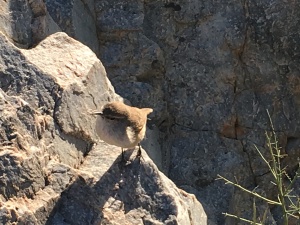
Early spring! Getting up early and walking in the garden, we could hear the sound of some small greenish bird, as small as a sparrow. It is a warbler, often heard than seen. This morning while hiking Piestewa Peak we saw one jumping around on rocky cliffs.
In Japan warbler (uguisu 鴬) is often associated with plum blossoms (ume 梅) as a symbol of early spring in poetry, ink paintings, and woodblock prints.

Bush Warbler and Plum (Ume ni uguisu)
Utagawa Hiroshige
鴬(うぐいす)の谷より出づる声なくは
春来ることを誰か知らまし
uguisu no
tani yori izuru
koe naku wa
haru kuru koto o
tare ka shiramashi
If not for the call
of the bush warbler coming
out of the valley,
who then would be aware of
the arrival of springtime?
Ōe no Chisato (大江千里)
—————
Chớm xuân! Thức dậy sớm bước ra vườn nghe tiếng hót của con chim hơi xanh, nhỏ như chim sẻ. Chim chích (hay chim oanh) thường nghe tiếng mà ít thấy hình. Sáng nay leo núi Piestewa Peak gặp một con nhảy nhót quanh vách đá.
Ở Nhật giống chim oanh thường đi với hoa mai (mơ) như biểu tượng của chớm xuân trong thi ca, tranh thủy mặc, và tranh khắc gỗ.
Nếu không có tiếng hót
của chim oanh
từ thung lũng,
ai biết
xuân đang đến?
Ōe no Chisato (大江千里 – Đại Giang Thiên Lí)
Notes:
1. Woodblock print source:
https://risdmuseum.org/art_design/objects/3928_bush_warbler_and_plum_ume_ni_uguisu
2. Poem source:
https://worldkigo2005.blogspot.com/2006/02/nightingale-uguisu.html?m=1
3. Kanji words — Các chữ Hán trong bài thơ:
鴬 or 鶯: oanh
谷: cốc — lũng, thung lũng
出: xuất
声: thanh
春: xuân
来: lai
誰: thuỳ
知: tri

